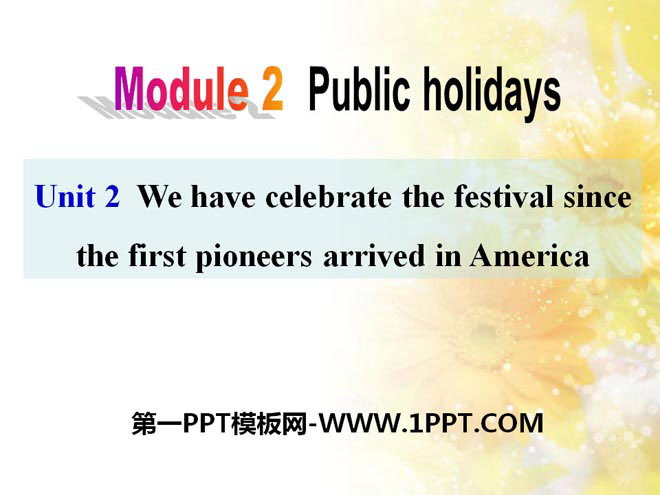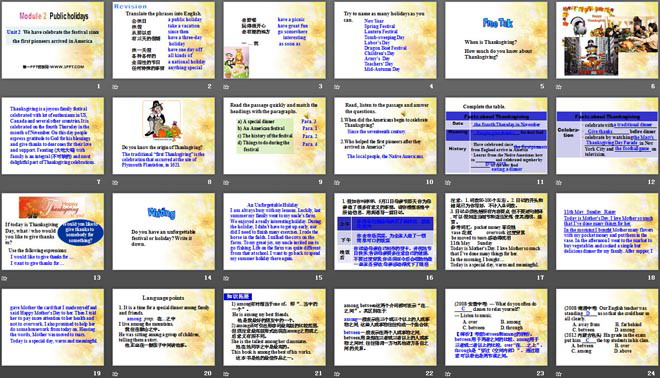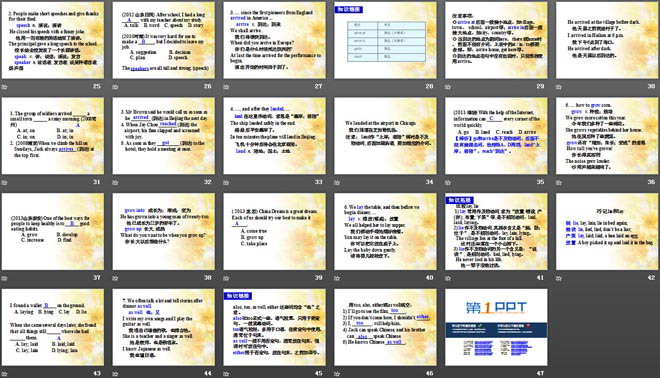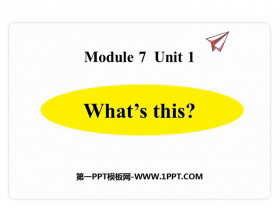


《We have celebrate the festival since the first pioneers arrived in America》Public holidays PPT课件2
Revision
Translate the phrases into English.
公休日 a public holiday
休假 take a vacation
从那以后 since then
有三天的假期 have a three-day holiday
休一天假 have one day off
各种各样的 all kinds of
全国性的节日 a national holiday
任何特殊的事情 anything special
... ... ...
Free Talk
When is Thanksgiving?
How much do you know about Thanksgiving?
Thanksgiving is a joyous family festival celebrated with lot of enthusiasm in US, Canada and several other countries. It is celebrated on the fourth Thursday in the month of November. On this day people express gratitude to God for his blessings and give thanks to dear ones for their love and support. Feasting (大吃大喝) with family is an integral (不可缺的) and most delightful part of Thanksgiving celebrations.
Do you know the origin of Thanksgiving?
The traditional “first Thanksgiving” is the celebration that occurred at the site of Plymouth Plantation, in 1621.
... ... ...
Read, listen to the passage and answer the questions.
1.When did the Americans begin to celebrate Thanksgiving?
Since the seventeenth century.
2.Who helped the first pioneers after they arrived in America?
The local people, the Native Americans.
If today is Thanksgiving Day, what / who would you like to give thanks to?
Use the following expressions:
I would like to give thanks for …
I want to give thanks for …
... ... ...
Language points
1. It is a time for a special dinner among family and friends.
among prep. 在…之中
I live among the mountains.
我住在群山之中。
He was sitting among a group of children, telling them a story.
他正坐在一群孩子中间讲故事。
知识拓展
1) among有时相当于one of, 即“…当中的一个”。
He is among my best friends.
他是我最好的朋友中的一个。
2) among还可引出形容词最高级的比较范围,但须注意最高级形式出现在among之前或之后意义有所不同。
She is the tallest among her classmates.
她在她同学之中是最高的。
This book is among the best of his works.
这本书是他的最佳作品之一。
among, between这两个介词都可表示“在…之间”。其区别在于:
among一般表示在三个或三个以上的人或事物之间, 这些人或事物往往构成一个集合体;
between一般表示在两个人或事物之间, between用来指在三者或三者以上的人或事物之间时, 往往强调一方与其他诸方各自之间的关系。
... ... ...
2. People make short speeches and give thanks for their food.
speech n. 演说;演讲
He closed his speech with a funny joke.
他用一则有趣的笑话结束了演讲。
The principal gave a long speech to the school.
校长给全校发表了一个长篇讲话。
speak v. 讲;说话;演说;发言
speaker n. 说话者; 发言者; 说某种语言者; 扬声器
3. … since the first pioneers from England arrived in America ...
arrive v. 到达;到来
We shall arrive .
我们将很快到达。
When did you arrive in Europe?
你们是什么时候抵达欧洲的?
At last the time arrived for the performance to begin.
演出开始的时间终于到了。
... ... ...
6. We lay the table, and then before we begin dinner, …
lay v. 摆放(餐桌);放置
We all helped her to lay supper.
我们都动手帮她摆好晚餐。
You may lay it on the table.
你可以把它放在桌子上。
Lay the baby down gently.
请将婴儿轻轻放下。
比较lay, lie
1) lay 常用作及物动词, 意为“放置, 铺设; 产(卵); 布置; 下蛋”等, 是不规则动词:laid, laid, laying。
2) lie 作不及物动词, 其基本含义是“躺;卧;位于”, 是不规则动词:lay, lain, lying。
The village lies at the foot of a hill.
这村庄坐落在一个小山脚下。
3) lie作不及物动词的另一个含义是:“说谎”, 是规则动词:lied, lied, lying。
He never lied in his life.
他一辈子没撒过谎。
... ... ...
7. We often talk a lot and tell stories after dinner as well.
as well 也;又
I write my own songs and I play the guitar as well.
我唱自己谱曲的歌,也弹吉他。
She is a teacher and a singer as well.
她是教师,也是歌唱家。
I know Japanese as well.
我也懂日语。
also, too, as well, either 这些词均含“也”之意。
also比too正式一些,语气较重,只用于肯定句,一般紧靠动词。
too语气较轻,多用于口语,在肯定句中使用,通常位于句末。
as well一般不用否定句,通常放在句末,强调时可放在句中。
either用于否定句,放在句末,之前加逗号。
... ... ...
用too, also, either或as well填空:
1) I'll go to see the film, _______.
2) If you don't come here, I shouldn't, ______.
3) I, ________ , will help him.
4) Jack can speak Chinese, and his brother can _______ speak Chinese.
5) He knows Chinese _________.
关键词:《We have celebrate the festival since the first pioneers arrived in America》教学课件,外研版九年级上册英语课件,九年级英语幻灯片课件下载,《We have celebrate the festival since the first pioneers arrived in America》PPT课件下载,.ppt格式












